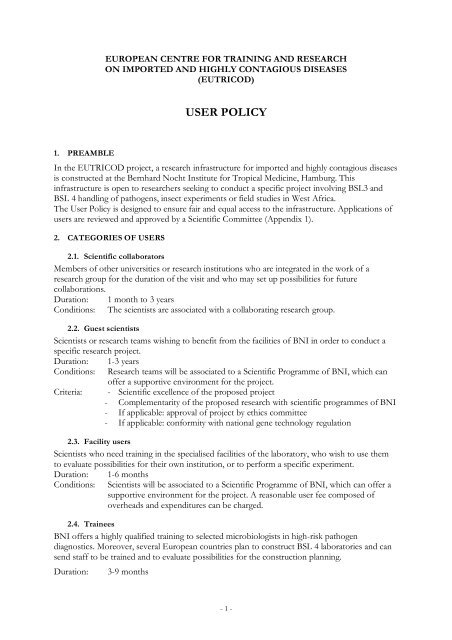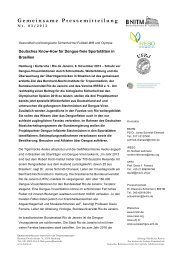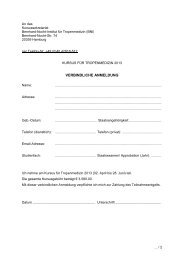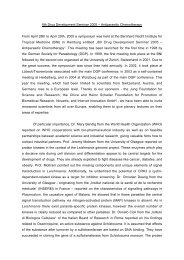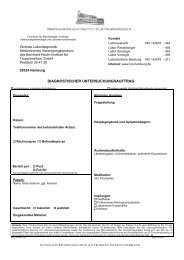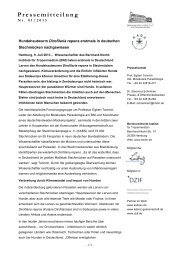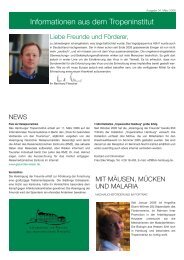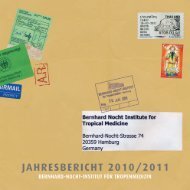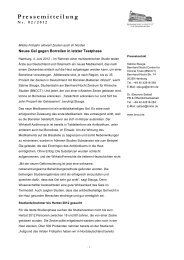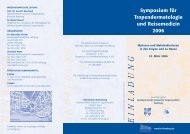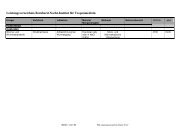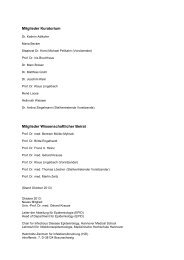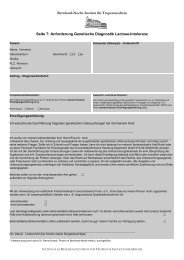EUTRICOD User Policy - Bernhard-Nocht-Institut für Tropenmedizin
EUTRICOD User Policy - Bernhard-Nocht-Institut für Tropenmedizin
EUTRICOD User Policy - Bernhard-Nocht-Institut für Tropenmedizin
Create successful ePaper yourself
Turn your PDF publications into a flip-book with our unique Google optimized e-Paper software.
EUROPEAN CENTRE FOR TRAINING AND RESEARCH<br />
ON IMPORTED AND HIGHLY CONTAGIOUS DISEASES<br />
(<strong>EUTRICOD</strong>)<br />
USER POLICY<br />
1. PREAMBLE<br />
In the <strong>EUTRICOD</strong> project, a research infrastructure for imported and highly contagious diseases<br />
is constructed at the <strong>Bernhard</strong> <strong>Nocht</strong> <strong>Institut</strong>e for Tropical Medicine, Hamburg. This<br />
infrastructure is open to researchers seeking to conduct a specific project involving BSL3 and<br />
BSL 4 handling of pathogens, insect experiments or field studies in West Africa.<br />
The <strong>User</strong> <strong>Policy</strong> is designed to ensure fair and equal access to the infrastructure. Applications of<br />
users are reviewed and approved by a Scientific Committee (Appendix 1).<br />
2. CATEGORIES OF USERS<br />
2.1. Scientific collaborators<br />
Members of other universities or research institutions who are integrated in the work of a<br />
research group for the duration of the visit and who may set up possibilities for future<br />
collaborations.<br />
Duration: 1 month to 3 years<br />
Conditions: The scientists are associated with a collaborating research group.<br />
2.2. Guest scientists<br />
Scientists or research teams wishing to benefit from the facilities of BNI in order to conduct a<br />
specific research project.<br />
Duration: 1-3 years<br />
Conditions: Research teams will be associated to a Scientific Programme of BNI, which can<br />
offer a supportive environment for the project.<br />
Criteria: - Scientific excellence of the proposed project<br />
- Complementarity of the proposed research with scientific programmes of BNI<br />
- If applicable: approval of project by ethics committee<br />
- If applicable: conformity with national gene technology regulation<br />
2.3. Facility users<br />
Scientists who need training in the specialised facilities of the laboratory, who wish to use them<br />
to evaluate possibilities for their own institution, or to perform a specific experiment.<br />
Duration:<br />
Conditions:<br />
1-6 months<br />
Scientists will be associated to a Scientific Programme of BNI, which can offer a<br />
supportive environment for the project. A reasonable user fee composed of<br />
overheads and expenditures can be charged.<br />
2.4. Trainees<br />
BNI offers a highly qualified training to selected microbiologists in high-risk pathogen<br />
diagnostics. Moreover, several European countries plan to construct BSL 4 laboratories and can<br />
send staff to be trained and to evaluate possibilities for the construction planning.<br />
Duration:<br />
3-9 months<br />
- 1 -
<strong>User</strong> <strong>Policy</strong><br />
<strong>EUTRICOD</strong><br />
Conditions:<br />
Criteria<br />
A reasonable training fee can be charged. Trainees are associated to the Virology<br />
groups.<br />
- High proficiency in standard microbiological practices and techniques,<br />
- Security clearance,<br />
- European interest (e.g. plans to establish national BSL 4 unit in home country).<br />
3. ELIGIBILITY<br />
Applications are welcome from scientists at any stage of their career. Scientists can be members<br />
of research institutes, universities, corporate organizations or private companies. The<br />
<strong>EUTRICOD</strong> infrastructure does not fund research visits. Applicants must bear their own costs.<br />
<strong>User</strong>s working in the infrastructure funded under the <strong>EUTRICOD</strong> project will be required to<br />
Accept FP6 ethical rules;<br />
Conduct no experiments for military purposes 1 or with potential for dual use;<br />
Follow specific SOPs of the infrastructure and safety rules;<br />
Publish their results within a reasonable time in the open literature.<br />
4. APPLICATIONS<br />
Applications are constantly reviewed. There is no deadline for submission of applications.<br />
Applications are submitted electronically by E-mail to the <strong>Bernhard</strong> <strong>Nocht</strong> <strong>Institut</strong>e, at least three<br />
months before the intended visit.<br />
4.1. Content of applications<br />
1) Curriculum vitae of the applicant (leading scientist) with references<br />
2) A letter of recommendation from the applicant´s organization<br />
3) A brief project proposal of no more than five pages indicating<br />
- When and for how long the visit is intended,<br />
- A potential collaborator or group for association,<br />
- Why experiments can not be conducted at home organization,<br />
- Specific facilities and equipment to be used,<br />
- Nature and aims of the general research project<br />
(without disclosing intellectual property),<br />
- Description of experiments to be carried out,<br />
- Funding.<br />
4.2. Requirements for users of the BSL 3 and BSL 4 facilities<br />
Visitors admitted for research and training in the BSL 4 unit will typically be sent by the<br />
Government of their home countries. A security clearance of applicants will be a prerequisite<br />
prior to admission.<br />
After approval by the Scientific Committee, a project involving work in the BSL 3 or BSL 4<br />
facilities of BNI will have to be evaluated by the German Federal Commission for Biosafety<br />
(ZKBS). Details on the procedure will be communicated to the project leader with the approval<br />
of his application.<br />
1 “military purpose” being defined in accordance with article 52(2) of the Additional Protocol I to the Geneva<br />
convention as “research aimed at an effective contribution to military action and offering a definite military<br />
advantage”.<br />
- 2 -
<strong>User</strong> <strong>Policy</strong><br />
<strong>EUTRICOD</strong><br />
4.3. Requirements for users of the BSL 3 laboratory at KCCR in Ghana<br />
Applicants for a research projects involving work at the collaborative research centre KCCR in<br />
Ghana are required to use a separate research application format (download at www.kccrghana.org<br />
or the <strong>EUTRICOD</strong> website). Special rules apply for research applications involving<br />
BSL 3 pathogens. These applications will be reviewed by the <strong>EUTRICOD</strong> Scientific Panel before<br />
being processed to the KCCR in Ghana.<br />
Research applications and ideas should be discussed well in advance with the Director of KCCR<br />
for the necessary advice (scientific partner, ethical clearance, costs, logistics). Confidentiality is<br />
ensured.<br />
Research at the collaborative research centre KCCR in Ghana is governed by a State Agreement<br />
between the Republic of Ghana and the Free and Hanseatic City of Hamburg. In essence, the<br />
Agreement states that<br />
all research will be conducted as collaborative projects with a Ghanaian scientist being a<br />
co-principal investigator (intellectual property thus equally shared),<br />
the activities of the unit are being supervised by an Advisory Board, which contains as<br />
members the Vice Chancellor of KNUST, the Dean of the Medical School, the Director<br />
and one other member of BNI, and is chaired by an outstanding Ghanaian scientist,<br />
projects involving human beings are subject to review by the local Committee on Human<br />
Research, Publication and Ethics.<br />
In addition a procedure to ensure compliance of BSL3-related studies with FP6 ethical rules was<br />
established in a separate agreement between BNI and its Ghanaian partners.<br />
5. SELECTION<br />
A Scientific Committee with three independent international experts reviews and approves<br />
applications. Applicants will be notified by E-mail as soon as possible on the outcome of the<br />
evaluation.<br />
Approval of a project is based on scientific excellence but will also take into account the interests<br />
of the European Community. Special attention will be paid to ensure equal opportunities for<br />
access by new users, capability building and gender issues. Priority will be given to European<br />
research teams who are working in regions of the Community where few such infrastructures<br />
exist and knowledge transfer is of high interest. Association of European researchers wishing to<br />
return from non-European countries will be encouraged. Other specific selection criteria are<br />
given in Section 1 (Categories of <strong>User</strong>s).<br />
5.1. Selection Procedure<br />
Applications are reviewed monthly by BNI committee members and distributed by E-mail to the<br />
external members of the Scientific Committee together with a standardized evaluation form. In<br />
cases of competing applications, each Committee member is asked to supply a rating of the<br />
respective applications.<br />
The Committee Chairman collects the evaluation comments and prepares a compilation. Based<br />
on the Committee´s approval, the Director of BNI decides on the final admission of applicants<br />
and grants association status to the visitor.<br />
In cases of contradictory evaluations, a discussion among commission members is initiated via<br />
telephone conferences or meetings.<br />
6. SUPPORT FOR VISITORS<br />
<strong>User</strong>s will be associated to one of the three scientific programmes of BNI (Appendix 2). Where<br />
appropriate, they will be integrated in one of the existing groups providing a supportive scientific<br />
environment. The scientific programme co-ordinator or the respective BNI group leader act as<br />
- 3 -
<strong>User</strong> <strong>Policy</strong><br />
<strong>EUTRICOD</strong><br />
the users´ contact person throughout their stay. Technical and logistical support required is<br />
provided by the experiences staff running the facility. Technical backup will include provision of<br />
offices and laboratory space, supervision of work in BSL 3 and BSL 4 laboratories, cell culture<br />
and animal husbandry. Scientific backup will be provided by specific seminars and colloquia. If<br />
desired, BNI administration will assist the visitor to find appropriate accommodation.<br />
Upon arrival, the <strong>User</strong> Manual with the relevant SOP´s and regulations is handed out to the<br />
visitor and equipment is demonstrated. Before commencement of the project, a provisional<br />
workplan will be devised in order to facilitate the smooth integration of the visitor into the dayto-day<br />
operation. Visitors may work independently or together with a BNI scientist.<br />
7. COSTS<br />
Depending on the category of user, a reasonable user or training fee may be charged, composed<br />
of costs and overheads. Research teams from EC member states and associated countries will be<br />
offered reduction of overheads until 2011. Research teams from German research institutions are<br />
not entitled to discounted conditions under the <strong>EUTRICOD</strong> project. Training fees will be<br />
offered at reduced rates to trainees from new member states of the European Community.<br />
Unless working in a collaborative research project with BNI, users are required to bear their own<br />
costs for travel, accommodation and consumables and to provide evidence of adequate funding.<br />
8. FURTHER APPLICABLE DOCUMENTS<br />
(available on the <strong>EUTRICOD</strong> website: www.bni-hamburg.de/eutricod)<br />
8.1. Form sheets<br />
- Research application <strong>EUTRICOD</strong><br />
- Research proposal KCCR<br />
- Ethical issues checklist for KCCR projects involving research on BSL 3 viruses<br />
- Evaluation checklist for <strong>EUTRICOD</strong> applications<br />
8.2. Further applicable documents<br />
- Procedure of admission of associated visitors in the <strong>Bernhard</strong> <strong>Nocht</strong> <strong>Institut</strong>e for<br />
Tropical Medicine” (update version)<br />
- <strong>User</strong> contract (update version)<br />
- <strong>User</strong> manual (update version)<br />
This document was adopted in the 1 st meeting of the Scientific Committee.<br />
Hamburg, September 5 th , 2006<br />
_________________<br />
Chairman<br />
- 4 -
<strong>User</strong> <strong>Policy</strong><br />
<strong>EUTRICOD</strong><br />
Appendix 1<br />
List of members of the <strong>EUTRICOD</strong> Scientific Committee<br />
Date: September 2006<br />
BNI members<br />
Professor <strong>Bernhard</strong> Fleischer<br />
Director<br />
PD Dr. Stephan Günther<br />
Head Department of Virology<br />
PD Dr. Joachim Clos<br />
Head of Commission for Biosafety and Genetic Engineering<br />
External members<br />
Professor Ernest Gould<br />
<strong>Institut</strong>e of Virology and Environmental Microbiology, Oxford, UK<br />
Professor Johan Neyts<br />
Faculty of Medicine<br />
Katholieke Universiteit Leuven, Belgium<br />
Professor Peter Sebo<br />
<strong>Institut</strong>e of Molecular Genetics, Czech Academy of Sciences, Prague, Czech Republic<br />
- 5 -
<strong>User</strong> <strong>Policy</strong><br />
<strong>EUTRICOD</strong><br />
Appendix 2<br />
Scientific Programmes of BNI<br />
Activities and aims of the programme areas are deduced from the mission and aims of the<br />
institute. Research activities orientate on the two main issues “relevance for disease prevention<br />
and control” and “use of tropical infections as models for general issues in medicine and<br />
biology”.<br />
1 Parasitology research<br />
Activities in the programme area concentrate on cellular and molecular biology of infectious<br />
agents that cause tropical diseases.<br />
Parasitic diseases play a major role in tropical countries. Many of them – like sleeping sickness<br />
and malaria- exclusively occur in tropical countries. Parasitology research focuses on human<br />
pathogens most relevant for morbidity and mortality in affected countries.<br />
Research activities aim to improve control of tropical parasitic infections. Basic research aims to<br />
understand the molecular basis of interaction with the host. Targets are invasion, mechanisms of<br />
persistence and evasion strategies of the parasite. Information from parasite genome projects<br />
allows for identification of novel pathways containing targets for therapeutic intervention.<br />
Applying modern tools in molecular biology, cell biology and biochemistry, the following<br />
activities are performed:<br />
<br />
<br />
<br />
<br />
Department of Molecular Parasitology: Research on variability and pathogenicity, and<br />
vaccine development;<br />
Research Groups Malaria: Invasion of human cellular compartments and parasitic evasion<br />
strategies;<br />
Research Group Leishmaniasis: drug resistance, stage conversion on transmission from<br />
insect to mammal, signal transduction pathways relevant for establishment of infection;<br />
Research Group Biochemical Parasitology: characterization of targets for drug<br />
development.<br />
Research covers pathogens causing malaria, leishmaniasis and amoebiasis.<br />
2 Medical microbiology research<br />
Activities in the programme area concentrate on the host reaction to infection. Host reaction is<br />
analyzed on the organism, organ system and cellular levels. Pathogens investigated are parasites,<br />
bacteria and viruses of medical importance.<br />
Research activities aim to understand specific reactions of the host in regard to infection with<br />
pathogen and to deduce measures to influence these reactions. Reactions are of importance for<br />
persistence and establishment of the pathogens, for immunity against subsequent infections and<br />
for the development of pathogenetic mechanisms.<br />
In this context, the following activities are performed:<br />
<br />
Department of Immunology: studies on the role of innate and adaptive immunity and<br />
cellular components in infection with Filaria, Plasmodia, Trypanosoma and Leishmania.<br />
Animal models are used to study effects in vivo. Furthermore, studies on the role of the<br />
immune system in pathogenesis, local and systemic mechanisms of cellular control in the<br />
immune response; role of effector cells.<br />
- 6 -
<strong>User</strong> <strong>Policy</strong><br />
<strong>EUTRICOD</strong><br />
<br />
<br />
Department of Virology: studies on immune response to viral infection and on<br />
interaction of virus with host cell. Identification of antigenic determinants to study their<br />
role in viral evasion, individual reactivity to virus determinants and epidemiological<br />
relevance. Development of reverse genetic systems to study the role of single viral<br />
proteins in the host cell. Studies focus on Arena-, Corona- and Flaviviruses, development<br />
and evaluation of diagnostic assays<br />
Research Group Helminth Immunology: interaction of the pathogenic nematode<br />
Strongyloides ratti with its rodent hosts, nematode mediated modulation of host immune<br />
response to bystander antigen and the parasite itself.<br />
3 Tropical Medicine<br />
Activities in the programme area focus on patient-related analysis of resistance, susceptibility,<br />
pathogenesis and pathology of disease.<br />
Starting points of studies are clinical patterns of disease and epidemiologic evidence of<br />
individuals with natural protection from infection. Studies aim to identify metabolic, regulative or<br />
cellular factors, which can protect individuals from infection or specific complications of the<br />
disease.<br />
Central activities are investigations on human genetic variants linked to resistance or<br />
susceptibility, through linkage analyses and association studies of candidate genes. Included is<br />
clinical characterisation of infections (attributes of pathogens, course of infection, pathogenesis<br />
and pathology). This work leads to accompanying intervention and prevention studies in endemic<br />
areas.<br />
In this context, the following activities are performed:<br />
Department of Molecular Medicine: studies on clinical and immunological<br />
characterization of patients, genome-wide linkage analyses and genetic association studies<br />
<br />
<br />
<br />
Department of Pathology: studies on cellular immune protection<br />
Clinical Research Group: clinical characterization of patients and intervention studies<br />
Research Group Infection Epidemiology: epidemiological studies and intervention<br />
studies in endemic areas<br />
Research covers malaria, tuberculosis, filarial infections and HIV/AIDS.<br />
02/2008<br />
- 7 -


